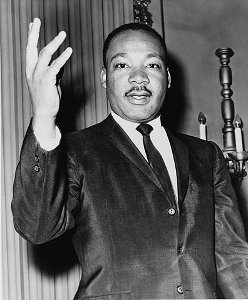A Lesson Plan for Grades 7–12
Lesson Overview

In this lesson students have the opportunity to discuss how words have the power to bring about political, social, or economic change in society. By reviewing quotations from various leaders, activists, and others, students can begin to understand how ideas have an impact on the hearts and minds of people and can be a catalyst for change. Finally, students will reflect on the words of Martin Luther King Jr. and determine their relevance to the political, social, and economic issues of today.
Suggested grade level: 7–12
Objectives: By the end of this lesson students should be able to
- reflect on how words have been a catalyst for change in society;
- provide examples of such change throughout history;
- discuss how powerful words by charismatic people could help bring change to society today.
Materials Needed
- Teacher Resource 1: Quotations for Introductory Activity
- Teacher Resource 2: Quotations by Martin Luther King Jr.
- Drawing paper
Estimated Time: One class period
Procedure
- Introduce the lesson. Ask students whether they have heard the phrase, "The pen is mightier than the sword." Edward Bulwer-Lytton, an English writer, wrote these words for his 1839 play, Richelieu; Or the Conspiracy. Can the students explain what this phrase means and provide a historical example that illustrates the concept (e.g., the Magna Carta or Martin Luther's Ninety-five Theses)? What kind of change have words brought about? Students should be able to point to political, social, and economic changes driven by the written or spoken word.
- Transition. These political, social, and economic changes are rooted in changes in the minds and hearts of people. Words that have spurred these changes can often be found in speeches or essays of great thinkers, activists, and others. Divide the class into small groups of three students. Provide each triad with a quotation found in Teacher Resource 1. Give the group approximately five minutes to examine the quotation and answer the following questions:
- What do you think the quotation means?
- Can you identify a period in American or world history where this quotation could be attributed? Explain.
- Who might have said this and why?
Share some or all of the groups' responses with the class
- The Words of Dr. King. Place the following quotation from Martin Luther King Jr. on the board: "The ultimate measure of a man is not where he stands in moments of comfort and convenience, but where he stands at times of challenge and controversy." Begin a discussion with students about the meaning of the quotation. How did this quotation fit his mission in the civil rights movement? How did this quotation reflect his philosophy of civic responsibility?
- Activity. Divide the class into groups of three of four. Give each group one or two quotations from King found in Teacher Resource 2. For each quotation students should try to
-
-
- explain the meaning of the quotation;
- describe the kind of change the sentiment was trying to support;
- determine what the quotation was asking individuals to reflect upon;
- describe how could the quotation could be used today.
-
Give students approximately ten to fifteen minutes to complete this activity. -
- Concluding the lesson. When the students are done, have each group share their responses with the class. If time allows (or for homework), share the list of King's quotations with the class. Each student should choose a quotation and then on a sheet of paper neatly write the quotation and either briefly describe how it could be helpful today or illustrate how the quotation could be applied today. Then display each of the quotations around the room.





